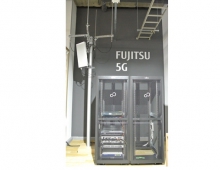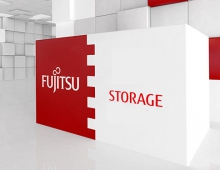
Fujitsu Develops Power Saving Technology for Container Data Centers
Fujitsu Laboratories has developed a power conservation
system control technology that reduces overall power
consumption in container data centers by controlling the
operation of servers and cooling (A/C) systems.
The overall power consumption of container data centers
can be effectively reduced by cutting the electricity
usage of A/C equipment through external ambient air and
other measures. At the same time, IT equipment power
consumption can be cut by employing servers that lack
internal fans. In the conventional approach to A/C
management, A/C systems and servers inside the containers
are controlled independently, thereby making it difficult
to efficiently cool fan-less servers.
 Fujitsu claims that by utilizing its new power saving
system control technology, which coordinates the
operation of servers and A/C systems, it is now possible
to employ fan-less servers and achieve across-the-board
power saving in container data centers.
Fujitsu claims that by utilizing its new power saving
system control technology, which coordinates the
operation of servers and A/C systems, it is now possible
to employ fan-less servers and achieve across-the-board
power saving in container data centers.
Fujitsu's power saving system control technology uses server information to manage container A/C fans. When a CPU's operating temperature becomes too high, the amount of power consumed by a server increases as a result of the impact of the CPU's leakage current. Conversely, by trying to lower the CPU temperature, greater power is consumed by the container A/C fan. The technology controls the container A/C fan to achieve an optimal CPU temperature that will enable the amount of power consumed by the entire container data center to be minimized.
In minimizing the overall power consumption of a container data center, local increases in CPU temperature can lead to operating temperatures that begin to negatively affect CPU performance. Fujitsu's technology controls the container A/C fan to ensure that the system never reaches an operating temperature where CPU performance is compromised.
In addition, even if a CPU's protection features kick in to safeguard against decreased performance or server shutdowns as a result of rising temperatures from sudden increases in CPU load, the technology can rapidly elevate the cooling fan's revolution speed and cool the system in response to the CPU temperature increase. This enables the server to maintain both its service levels and low-power operation.
Prototype models of container data centers equipped with this new technology were able to achieve a reduction in total energy consumption of up to 40%, according to the company.
Fujitsu Laboratories aims to employ the technology in commercial applications during fiscal 2012, and will move forward with tests using prototype container data centers in environments with varying temperature and humidity.
 Fujitsu claims that by utilizing its new power saving
system control technology, which coordinates the
operation of servers and A/C systems, it is now possible
to employ fan-less servers and achieve across-the-board
power saving in container data centers.
Fujitsu claims that by utilizing its new power saving
system control technology, which coordinates the
operation of servers and A/C systems, it is now possible
to employ fan-less servers and achieve across-the-board
power saving in container data centers.
Fujitsu's power saving system control technology uses server information to manage container A/C fans. When a CPU's operating temperature becomes too high, the amount of power consumed by a server increases as a result of the impact of the CPU's leakage current. Conversely, by trying to lower the CPU temperature, greater power is consumed by the container A/C fan. The technology controls the container A/C fan to achieve an optimal CPU temperature that will enable the amount of power consumed by the entire container data center to be minimized.
In minimizing the overall power consumption of a container data center, local increases in CPU temperature can lead to operating temperatures that begin to negatively affect CPU performance. Fujitsu's technology controls the container A/C fan to ensure that the system never reaches an operating temperature where CPU performance is compromised.
In addition, even if a CPU's protection features kick in to safeguard against decreased performance or server shutdowns as a result of rising temperatures from sudden increases in CPU load, the technology can rapidly elevate the cooling fan's revolution speed and cool the system in response to the CPU temperature increase. This enables the server to maintain both its service levels and low-power operation.
Prototype models of container data centers equipped with this new technology were able to achieve a reduction in total energy consumption of up to 40%, according to the company.
Fujitsu Laboratories aims to employ the technology in commercial applications during fiscal 2012, and will move forward with tests using prototype container data centers in environments with varying temperature and humidity.





















